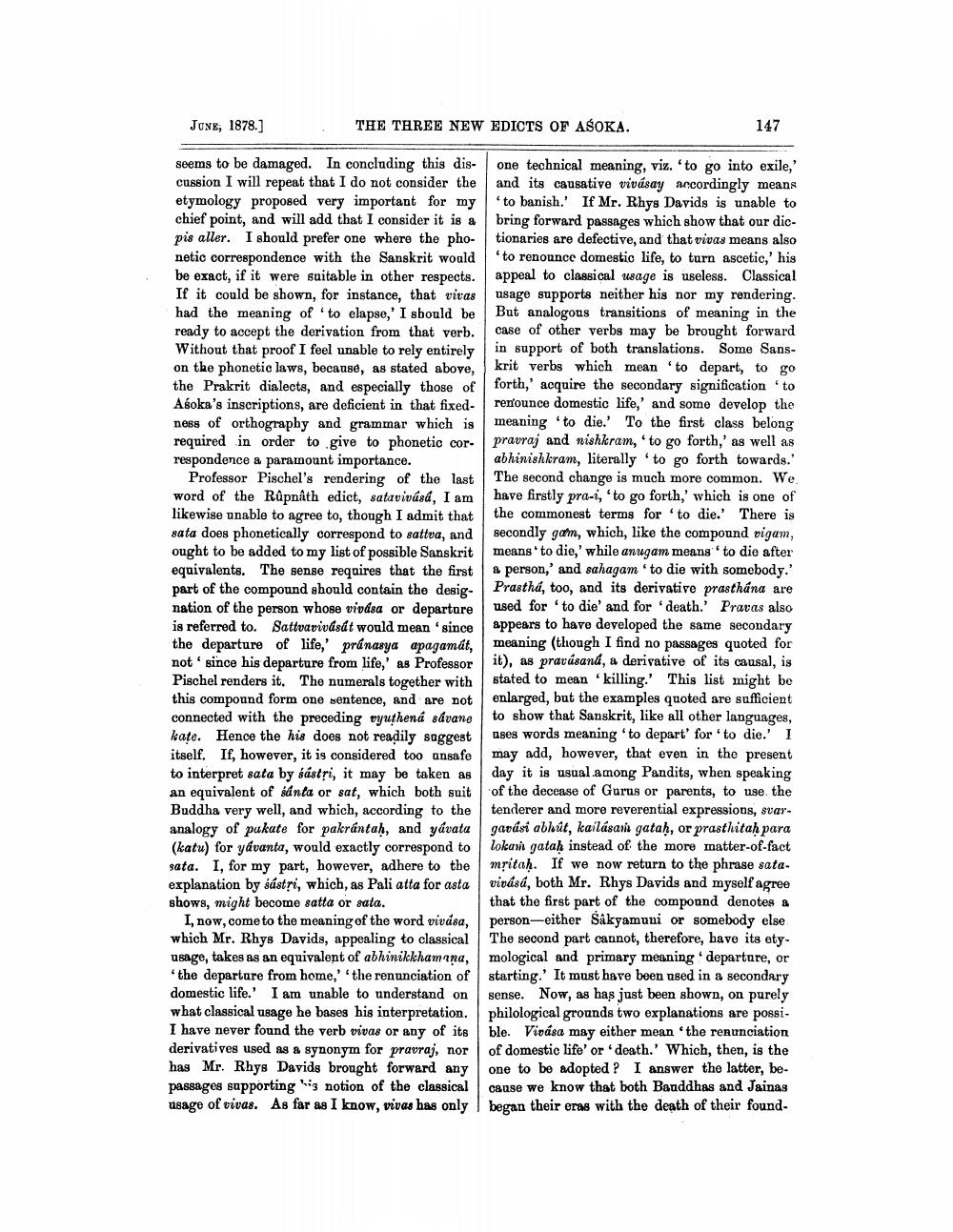________________
JONE, 1878.]
THE THREE NEW EDICTS OF ASOKA.
147
seems to be damaged. In concluding this dis- one technical meaning, viz. to go into exile,' cussion I will repeat that I do not consider the and its causative vivásay accordingly means etymology proposed very important for my to banish.' If Mr. Rhys Davids is unable to chief point, and will add that I consider it is a bring forward passages which show that our dicpis aller. I should prefer one where the pho- tionaries are defective, and that vivas means also netic correspondence with the Sanskrit would "to renounce domestic life, to turn ascetic,' his be exact, if it were suitable in other respects. appeal to classical usage is useless. Classical If it could be shown, for instance, that vitas usage supports neither his nor my rendering. had the meaning of 'to elapse,' I sbould be But analogous transitions of meaning in the ready to accept the derivation from that verb. | case of other verbs may be brought forward Without that proof I feel unable to rely entirely in support of both translations. Some Sanson the phonetic laws, because, as stated above, krit verbs which mean to depart, to go the Prakrit dialects, and especially those of forth,' acquire the secondary signification to Asoka's inscriptions, are deficient in that fixed- renounce domestic life,' and some develop the ness of orthography and grammar which is meaning to die. To the first class belong required in order to give to phonetic cor- pravraj and nishkram, to go forth,' as well as respondence a paramount importance.
abhinishloram, literally to go forth towards.' Professor Pischel's rendering of the last The second change is much more common. We word of the Rūpnâth edict, satavivúsd, I am have firstly pra-i, "to go forth,' which is one of likewise unable to agree to, though I admit that the commonest terms for 'to die.' There is sata does phonetically correspond to sattva, and secondly gam, which, like the compound vigam, ought to be added to my list of possible Sanskrit means to die,' while anugam means to die after equivalents. The sense requires that the first & person,' and sahagam to die with somebody.' part of the compound should contain the desig- Prasthú, too, and its derivative prasthána are nation of the person whose vivdsa or departure used for 'to die' and for death.' Pravas also is referred to. Sattvarivását would mean 'since appears to have developed the same secondary the departure of life,' pránasya apagamát,
meaning (though I find no passages quoted for not since his departure from life,' as Professor it), as pravúsand, a derivative of its causal, is Pischel renders it. The numerals together with stated to mean 'killing. This list might be this compound form one sentence, and are not enlarged, but the examples quoted are sufficient connected with the preceding vyuthená sávane to show that Sanskrit, like all other languages, kate. Hence the his does not readily saggest
ses words meaning 'to depart' for 'to die.' I itself. If, however, it is considered too unsafe may add, however, that even in the present to interpret sata by sústri, it may be taken as day it is usual among Pandits, when speaking an equivalent of sánta or sat, which both suit of the decease of Gurus or parents, to use the Buddha very well, and which, according to the tenderer and more reverential expressions, svaranalogy of pukute for pakrántah, and yavata gavási ablut, karlásari gatah, or prasthitah para (katu) for yávanta, would exactly correspond to lokam gatah instead of the more matter-of-fact sata. I, for my part, however, adhere to the mritah. If we now return to the phrase sataexplanation by sústri, which, as Pali atta for asta vivásá, both Mr. Rhys Davids and myself agree shows, might become satta or sata.
that the first part of the compound denotes a I, now, come to the meaning of the word vivása, person-either Sakyamuni or somebody else which Mr. Rhys Davids, appealing to classical The second part cannot, therefore, have its etyusage, takes as an equivalent of abhinikkhamana, mological and primary meaning departure, or
the departure from home, the renunciation of starting.' It must have been used in a secondary domestic life. I am unable to understand on sense. Now, as has just been shown, on purely what classical usage he bases his interpretation. philological grounds two explanations are possiI have never found the verb vivas or any of its ble. Virása may either mean "the renunciation derivatives used as a synonym for pravraj, nor of domestic life' or death.' Which, then, is the has Mr. Rhys Davids brought forward anyone to be adopted ? I answer the latter, bepassages supporting 'is notion of the classical cause we know that both Banddhas and Jainas usage of vivas. As far as I know, vivas has only I began their eras with the death of their found




